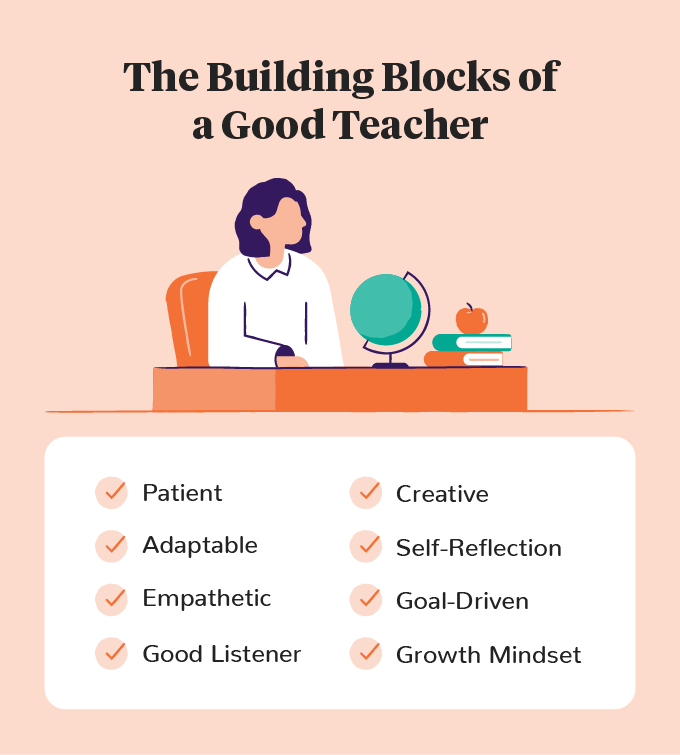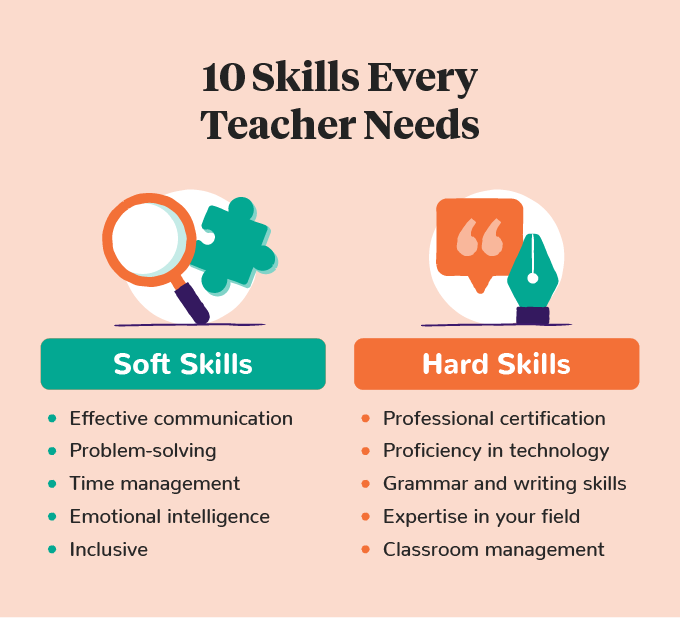What Makes a Good Teacher? 15 Qualities You Should Have

|
Quick Answer A good teacher embodies many core qualities, including patience, empathy, adaptability, and respect. There are also various hard and soft skills that effective teachers should hone, from classroom management to emotional intelligence. |
Think back to the best teacher you ever had. What qualities did they embody? What skills did you observe?
Teaching any age or skill level can be one of the most challenging yet rewarding professions. It’s no secret that more and more is being asked of teachers, especially in a post-pandemic era, from serving as IT troubleshooters and mentors to mental health advocates.
So what makes a good teacher in 2023? Beyond passing your teacher certification exam, what sets good teachers apart comes down to essential skills. While many different teaching styles and skill sets can make a good educator, a few core qualities of a good teacher are undoubtedly required.
Here, we’ll explore effective teacher characteristics, the hard and soft skills that educators should have, and how you can hone your teaching style. Whether you have decades of experience or you’re a first-year teacher, discover how to be the educator your students remember for years to come.

1. Patient
From rowdy students to administrators with opposing views, you’re bound to have your patience tested a time or two as a teacher. However, patience is one of the most important characteristics a teacher should have as it’s a stepping stone to many other qualities that make a good educator.
To practice patience with your students, try these tips:
- Get in a positive mindset and leave personal issues outside of the classroom
- Slow down and be responsive, not reactive
- Try to practice calming techniques, like counting to 10, in difficult situations
2. Adaptable
One thing will remain consistent throughout your teaching career: Every day will be different. Whether it’s in-classroom technology or state standards, the education field is constantly evolving. Teachers need to adapt to these changes and adjust their teaching methods and lessons accordingly.
When practicing adaptability in the classroom, you should:
- Be open-minded
- Be aware of different learning styles
- Hone your problem-solving skills and ability to think on your feet
3. Respectful
Take a minute to remember back in grade school when your teacher ingrained the golden rule in your brain — treat others the way you want to be treated. So while it’s not unrealistic for you to expect your students to be respectful, it’s also important for you to reciprocate that respect.
Here are a few ways you can show respect to your students:
- Provide constructive feedback rather than simply marking answers as wrong
- Be fair and offer choices to students
- Show your students trust by encouraging autonomy
4. Empathetic
According to the American Psychological Association, positive and supportive relationships between students and teachers improves students’ academic success and social development. Empathy is key to building relationships and fostering trust
To empathize with your students, try to:
- Acknowledge and validate your students’ feelings
- Listen without judgment
- Let your students know that your classroom is a safe space
5. Creative
A teacher doesn’t need to be an amazing artist to be creative. Show your creativity in your classroom decor, theme, lesson plans, and so on. Get in tune with your creative side by stepping outside your comfort zone and thinking outside the box.
A few ways you foster creativity in your classroom include:
- Giving children the opportunity to explore and experiment
- Showcasing students’ artwork in the classroom and hallway
- Finding unique ways to use sound cues in your classroom, like using a song as a timer
6. Prepared
A good teacher comes prepared to class — just like their students. Preparation for the day entails planning lessons, materials, and other activities. While much of this preparation takes place outside of the classroom, teachers often have dedicated periods to prepare future lessons and grade assignments.
Here are some tips for being prepared as a teacher:
- Put together the week’s lesson plans at the beginning of the week.
- Study your lectures, notes, and assignments beforehand.
- Provide extra materials and additional resources on the topic.
7. Engaging
If a lesson seems boring to you, it’s safe to say your students will likely feel the same, which is why you need to engage with them.
An effective teacher incorporates varying teaching methods to keep students interested in lessons. For instance, project-based teaching lets students work independently or in groups to apply the knowledge they’ve learned in your class.
Implement these strategies to boost engagement:
- Use humor to capture your students’ attention
- Write creative lesson plans that appeal to the most common learning styles
- Facilitate student-led discussion and ask students why the answer is correct
8. Good Listener
Good listening plays a vital role in effective communication, and it allows teachers to understand their students. When teachers better understand their students, they can tailor their teaching to better meet their individual needs.
Here are a few tips for practicing good listening skills:
- Make eye contact with students as they talk.
- Be observant of verbal and nonverbal cues..
- Give a few seconds before responding to ensure the student’s thought is complete.
VIDEO: 5 Tips for New Teachers
9. Proactive
Being proactive means anticipating potential problems or needs and having an action plan if the situation occurs. A proactive teacher sets practices to avoid challenging situations — often disruptive behaviors — when possible.
You can be proactive as a teacher with these research-backed strategies:
- Greet students at the door when they arrive to set a positive tone for the day.
- Foster relationships with your students so they know you care.
- Establish behavioral expectations and explain the consequences of poor behaviors.
10. Collaborative
Collaboration is vital in most workplaces, and teaching is no different. Schools have several teachers, paraprofessionals, and administrators that work together to create a safe, educational environment for students. When teachers share their knowledge with one another, it creates a well-rounded learning experience for students.
Prioritize collaboration in your teaching career by:
- Getting to know your colleagues within the school and touch base often, especially if you share students
- Being open-minded to constructive criticism and suggestions from peers
- Planning group projects for students to practice collaborating with one another
11. Self-Reflective
While peer and supervisor critique helps educators identify blind-spots, it shouldn’t replace self-reflection. Self-reflection isn’t easy, but it allows you to think critically and boost self-awareness. Practice looking within to identify room for improvement in teaching methods, attitude, and communication.
A few ways you can practice self-reflection are:
- Keep a journal to record what worked well and what to improve upon each day.
- Participate in peer reviews and ask colleagues for feedback, or record your lessons (if allowed).
- Identify repetitive student behaviors or questions to indicate areas for improvement.
12. Growth Mindset
Being self-reflective and prioritizing personal growth go hand in hand. A growth mindset is the concept that you can always better yourself. Individuals who hold a growth mindset approach challenges as opportunities to learn. They view challenges as a way to teach the brain to work harder and, in turn, see improvements in their abilities.
As a teacher, you may always strive to be better, but it’s important to foster that same growth mindset in students. You can do this by:
- Normalizing mistakes and struggles as a way to grow
- Adding the word “yet” to your vocabulary and discouraging the word “can’t”
- Setting achievable goals for your students as a whole and individually
13. Knowledgeable
As a teacher, you must dedicate yourself to a lifetime of learning and become a fountain of information — after all, you are an expert in your subject, whether it’s history, science, or so on.
Work on widening your knowledge by:
- Reading books on teaching best practices and specific subjects
- Attending education conferences and enrolling in teaching workshops
- Sharing what you’ve learned with other educators
14. Accessible
To be a good teacher, you must be accessible. You want your students to know they can always come to you, whether to chat about life outside the classroom or get help on homework. As a teacher, you should be there when your students need you.
Show that you are available to your students by:
- Walking around the classroom and checking with students individually while they complete heads-down work
- Encouraging students to come to you with questions
- Telling your students when you have free periods
15. Goal-Driven
A teacher’s main goal is the success of their students. But within that lies everyday goals like acting as a positive influence and hitting specific test grades. You can set goals for students and for yourself as their teacher.
Some examples of achievable goals you could set:
- Be more organized and write the week’s lessons planned out on Sundays.
- Facilitate more productive lessons and encourage active participation through student-led dialogue.
- Introduce more well-rounded lessons utilizing movement, music, art, and critical thinking.
Skills of a Teacher

There’s no shortage of skills needed to be a teacher in the classroom today, from hard skills like computer and writing proficiencies to soft skills like time management and critical thinking.
Hard Skills
Hard skills are taught through education or training, may be measurable, and are often technical. Think of these skills as the absolute requirements you need to do a job or task. For instance, if you are a barista, you need to be able to make a latte.
Examples of hard skills for teachers include:
- Professional certification
- Proficiency in technology
- Grammar and writing skills
- Expertise in your field of study
- Classroom management
Soft Skills
Soft skills are more difficult to measure. They’re similar to personal characteristics that can help make a teacher better at their job. They may be natural to you as a person, but you can also learn them through experience.
Other examples of soft skills for teachers include:
- Effective verbal communication
- Problem-solving
- Time management
- Inclusivity
- Emotional intelligence
What Makes the Best Teacher, Ever?
The best teachers prioritize student-teacher relationships because students who feel valued tend to focus better and enjoy learning. When you embody these qualities and skills, it makes you a stronger educator and sets a good example for students to take into adulthood.
If you’re a new graduate looking to start your teaching career, use these 15 qualities and 10 skills to build your teacher resume and land your first interviews as a teacher.
CTA: Looking to become a teacher? Start your journey today with our state-specific study guides to ace your certification test.

